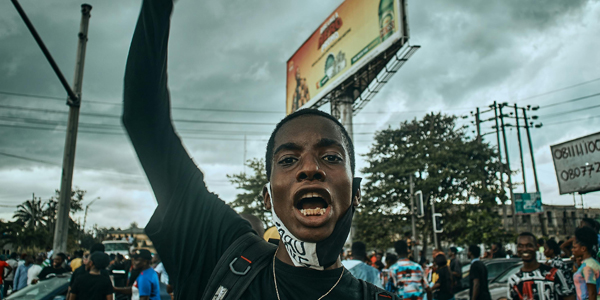Reimagining democracy
- Beth Amato
Democracy, as a system of government by the whole population, seems to have had its heyday. Is ‘People Power’ a viable option?

In the 1991 movie Thelma and Louise, the two female protagonists were literally behind the wheel (in this case of a convertible Ford Thunderbird) after they took a decision, in the face of violent patriarchy, to own their story.
In that classic final scene, when their car flies into the Grand Canyon, the message is that while women can strive for heady freedom and defy imposed and traditional roles, it turns out that the ideal is just a Hollywood fantasy. Then as now.
Thelma and Louise becoming a cult classic coincided with democracy’s big moment. Evan Cupido and Raphael de Kadt, writing for the Helen Suzman Foundation, noted that the world rode a wave of democratisation in the 1980s and early 1990s, as authoritarian states began to wane. Adopting democracy was attractive, coloured, as it was, by the West’s economic and political tenets.
But, like Thelma and Louise’s defiance of entrenched systems, democracy is fragile. Moreover, it has a growing number of staunch, conservative opponents.
In defence of democracy
“Liberal democracy was advancing confidently from the mid-1970s to the 1990s. But we see now how fragile the system is across the world. The 2008 global economic crisis revealed how democracy did not ensure economic prosperity for everyone,” says Professor Daryl Glaser in the Department of Political Studies.
The evidence is that democracy is compatible with economic growth but does not guarantee it. Indeed, both democracy and dictatorship can succeed and fail economically.
China’s authoritarian government has been economically successful in recent decades. “But we can also say that China got lucky with its dictators. Where democracy is useful is that it offers the possibility of peaceful ‘course correction’ through voting. In China, if something goes wrong, there is no mechanism for people to replace leaders,” says Glaser.
Democracy’s intrinsic merits are therefore evident: “We can defend democracy because political equality, participation, freedom, and procedural fairness are fundamental. For some people, this is sufficient and an end in itself,” says Glaser.
Will South Africa’s democracy survive after 2024?
Glaser says that South Africa’s democracy is procedurally sound, but the democratic constitutional settlement did not achieve everything that people wanted. “There is a disconnect between the rulers and the ruled,” says Glaser. Today, South Africa is economically stagnant and socially unequal.
Moreover, this country’s democracy has not been put to its biggest test: will the African National Congress (ANC) concede power if it loses an election? And, if it does, can South Africa be well run by a coalition government? “The ANC will for a long time be the largest party, but we can cautiously predict that it will not get the majority of votes in the 2024 election,” says Glaser.
Realistically, the best hope for South Africa is a stable coalition where partners curb the ANC's excesses, patronage, corruption and authoritarianism. “We will need current opposition parties to play their part in maintaining a stable democracy. This can’t be the ANC’s burden alone.” If a non-ANC coalition exists, its multiple constituent parties must demonstrate that they can get along.
Moreover, democracy needs the backing and support of effective administration. “South African state administration probably requires an injection of professionalism and less partisan cadre deployment,” says Glaser.
This is not to say that the free market should reign supreme, but that efficient bureaucratic systems should ensure service delivery and the realisation of human freedoms.
Imperfect politics and the pursuit of happiness
Visiting Professor Mia Swart in the School of Law says that there has been democratic backsliding, particularly in the treatment of immigrants and minorities. In 2019, when India (often referred to as the world’s most populous democracy) passed its Citizenship Amendment Act, it effectively excluded Muslims from becoming Indian citizens.
“How far do we need to drift from the principles of democracy for it no longer to be a democracy? There is little pressure on India to democratise its policies. In Europe, where strong democratic values and human rights have been central, there is a rise in right-wing, anti-immigrant rhetoric and we now doubt what Europe stands for,” says Swart.
In Singapore, there is economic prosperity but little personal freedom. “Would you rather live in a poor democracy or a wealthy democratic state?” asks Swart. She says that what people most want is tangible goods and services. “Material goods play a huge role in people’s happiness. Democracy and progressive constitutions don’t put bread on the table. People want to feel happiness on a daily basis.”
For Swart, democracy fails if it doesn’t focus on the pursuit of happiness. “But right now, it’s the best of the other bad options.” In South Africa, the devastating levels of youth unemployment should be everyone’s focus. “Every political party’s manifesto must address this. Yes, we honour individual freedoms, but we are failing an entire sector of the population.”
Confronted with urgent issues such as youth unemployment, pervasive, and entrenched patterns of violence, disruption and poverty, no political system will be a quick fix. Democracy should continuously be reimagined in its national context.
- Beth Amato is a freelance writer.
- This article first appeared in Curiosity, a research magazine produced by Wits Communications and the Research Office.
- Read more in the 17th issue, themed: #Democracy, we turn to our academics and professional staff for their research, perspectives and commentary on both the progress and shortcomings in our democracy, and democracies elsewhere.

